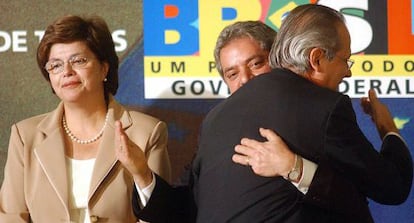Brazil’s largest corruption case could be reopened if top court grants appeal
Twelve convicted former officials of Lula da Silva’s government could get new trials


The credibility of Brazil’s entire political class is hanging in the balance as the Supreme Court awaits a final vote to break an impasse on whether a retrial should be held in the country’s biggest corruption case that rocked the previous presidential administration of Luiz Inácio Lula da Silva.
Twelve of 25 ruling Workers’ Party (PT) former officials are appealing the convictions and sentences, which were handed down last year.
On Wednesday, Supreme Court Chief Justice Celso de Mello is expected to cast his deciding vote to break a five-to-five bench tie and either grant or deny a new trial to the former officials, including Lula da Silva’s ex-chief of staff, José Dirceu, who was considered the mastermind behind the so-called mensalão scandal.
Dirceu and others were convicted on charges that they ordered hundreds of thousands of reals in monthly (mensalão) payments to key congressmen in order to ensure they voted in favor of Lula da Silva's legislation during his first term (2003-2007). The former president – who at one point tearfully apologized for the behavior of his most trusted aides – was never charged in the case.
After a month-long trial in 2012, a total of 25 former politicians were convicted. But only 12 qualified to appeal their sentences under an old Supreme Court rule, which could grant them a new trial. Among them is Dirceu who was sentenced last November to nearly 11 years in prison.
In such an outcome, their prison terms could be reduced, charges could be dropped because of the statute of limitations, or they could receive house arrest.
If the chief justice votes against the petition, those convicted will be sent to prison
De Mello’s vote could have wide implications for Brazilian society and the country’s institutions. If he votes in favor of granting the 12 a new trial, it could be seen as a political maneuver to favor the once-influential politicians. A favorable vote would also perhaps mean that all 25 of the convicted former officials would probably get new trials, which could last up to three years as the process begins from scratch, legal analysts said.
But if the chief justice votes against the petition, those convicted will immediately be sent to prison because they would have lost all their legal recourses – a development that could also set off fresh political tensions.
The investigation began in 2005 with 44,000 pages in the case file, including testimonies and witness interviews. The targets of the investigation were part of the top echelon of Lula da Silva’s PT. Dirceu was considered the president’s right-hand man and one of the most influential politicians in the country. When the mensalão case first broke, PT officials charged that it was an attempt to discredit the leftist government of Lula da Silva as well as that of his successor, the current President Dilma Rousseff.
Brazilians have become fed up with what they claim is widespread corruption among the different government bodies, at the same time as public services dwindle and transportation costs rise. In June, hundreds of thousands of citizens took to the streets in nightly demonstrations in major cities to protest everything from underpowered civil rights to rampant corruption. While the momentum has since tempered, the demonstrations continue to be held on an irregular basis.
Lula da Silva and PT officials have denied making any payoffs but did acknowledge that there was an extensive lobbying effort to try “to convince” lawmakers to vote in favor of certain legislation.
Dirceu has always maintained his innocence. "I never committed any illegal or criminal act as a member of the PT, member of parliament or government minister," he said during last November’s sentencing, adding that the entire case "lacked substantial evidence."
But Justice Joaquim Barbosa wrote of Dirceu in his ruling: "He put the basis of an entire democratic system at risk."
Tu suscripción se está usando en otro dispositivo
¿Quieres añadir otro usuario a tu suscripción?
Si continúas leyendo en este dispositivo, no se podrá leer en el otro.
FlechaTu suscripción se está usando en otro dispositivo y solo puedes acceder a EL PAÍS desde un dispositivo a la vez.
Si quieres compartir tu cuenta, cambia tu suscripción a la modalidad Premium, así podrás añadir otro usuario. Cada uno accederá con su propia cuenta de email, lo que os permitirá personalizar vuestra experiencia en EL PAÍS.
¿Tienes una suscripción de empresa? Accede aquí para contratar más cuentas.
En el caso de no saber quién está usando tu cuenta, te recomendamos cambiar tu contraseña aquí.
Si decides continuar compartiendo tu cuenta, este mensaje se mostrará en tu dispositivo y en el de la otra persona que está usando tu cuenta de forma indefinida, afectando a tu experiencia de lectura. Puedes consultar aquí los términos y condiciones de la suscripción digital.








































